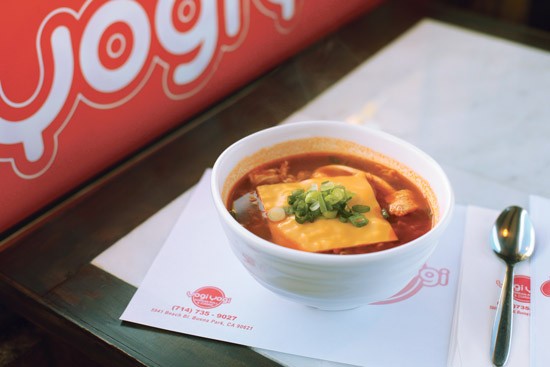
What do you expect to see when you walk into a Korean restaurant? Galbi? Yes. Kimchi? Absolutely. SPAM®, America's most notorious canned luncheon meat? Not so much. But believe it or not, South Korea is the second-largest consumer of SPAM® in the world, introduced to it by American servicemen just as it was in the Philippines and Hawaii. So the SPAM® in Yogi Yogi's gimbap is no accident, and neither is the slice of good ol' American processed cheese plopped on top of the ramen. What might surprise you more than the fact that Yogi Yogi's SPAM® roll is delicious–wrapped in a thin omelet and tucked tightly inside seaweed with rice and pickles that snap between your teeth–is that the restaurant isn't some Roy Choi hybrid. It's an all-Korean eatery called a bunsik, a place that specializes in inexpensive Korean meals that, for a lack of a better term, is the equivalent to American fast food.
]
Despite that and being housed in a building that used to be an old-school Taco Bell, the food at Yogi Yogi is made to order. To drink, there's soju and beer. And nearly everything you can eat is priced less than $10 and designed to be filling. Nothing is more satisfying here than the topokki–eternally chewy, cork-sized Korean rice cake cylinders served with all manner of sauces and toppings that can include Korean blood sausage and mozzarella. The best topokki is the soy carbonara, for which bacon, egg, grated cheese and black pepper turn into the velvet that coats everything, mitigated by soy sauce and some onions. But be warned: Since the texture of topokki can be as resilient as an old piece of gum, jaw fatigue sets in before you can make it through half the dish. I recommend sharing it with at least one other person, preferably not someone with dentures.
Almost everything Yogi Yogi makes is apt for sharing. Its array of gimbap, the Korean version of sushi rolls, pretty much requires you have at least one friend in tow before you order. The one with SPAM® comes in 14 pieces that any one person shouldn't try to finish by himself. And there are gimbap samplers that have three or more kinds of rolls arranged in rows of seven. If it's your first time–or even if it's not–order one of these. There's a sampler of gimbap stuffed with tuna salad, stir-fried kimchi and crispy fried anchovies. There's another with garlic and bacon, teriyaki beef, and a spicier version of the fried-anchovies roll that's actually hotter than I expected. No matter which sampler you take, you're supposed to drag each roll through a squiggle of white sauce that may or may not be mayo. Upon seeing one with teriyaki and mozzarella, I contemplated how far the sushi roll has diverged from what can be considered traditional.
But what it proves is that all food evolves, and as the world gets smaller and smaller, the influence of one culture on another makes for some interesting and fun stuff. At Yogi Yogi, nothing is more interesting and fun than the cheese ramen: a bowl of what I assume is instant Shin Ramyun cooked with its seasoning packet, but served with a slice of processed American cheese on top. You're supposed to work the melting cheese into the lava-red broth until it disappears. The cheese is intended to round out the heat and add richness. Did it make the ramen actually taste better? Kind of. Did it need even more cheese? Probably. And it does inspire me to finally try this ramen hack at home. Before I saw it at Yogi Yogi, both Roy Choi and the popular Eat Your Kimchi YouTube show convinced me with their recipes that the combo would work.
Yogi Yogi also offers some very traditional dishes such as bibimbap and kimchi bibim noodle, a tangle of cold vermicelli strands tossed with kimchi and onions, everything slicked with a gochujang-based, spicy sweet-and-sour sauce that induces a slow burn as it cools you down. And the kitchen fries a greaseless tonkatsu, served in thin spears to be dipped in a dark sauce that has the slight sting of something alcoholic. But in the same breath, and on the same side of the menu, Yogi Yogi offers something it calls “Cajun Chicken Salad.” It consists of deep-fried chicken fingers on top of salad greens drizzled with honey-mustard dressing–something that would've been weird to see in a Korean restaurant if I didn't already find SPAM® in the sushi and American cheese on the ramen.
Yogi Yogi, 5941 Beach Blvd., Buena Park, (714) 735-9027; yogi-yogi.site.mobi. Open Sun.-Thurs., 11 a.m.-10 p.m.; Fri.-Sat., 11 a.m.-midnight. Food for two, $20-$30, food only. Beer and soju.
Before becoming an award-winning restaurant critic for OC Weekly in 2007, Edwin Goei went by the alias “elmomonster” on his blog Monster Munching, in which he once wrote a whole review in haiku.

